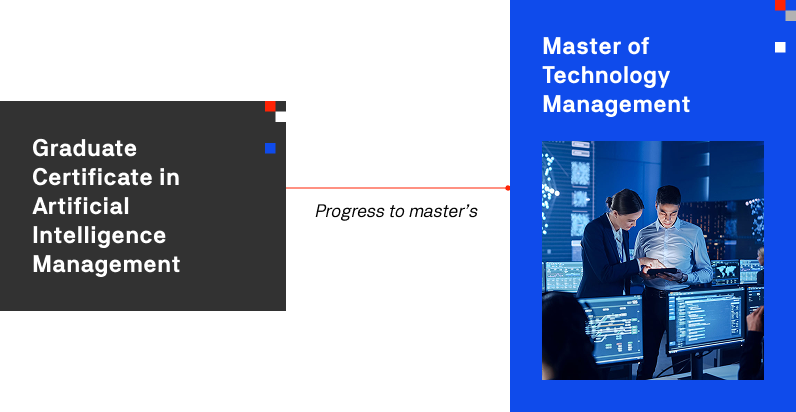Why study the Graduate Certificate in Artificial Intelligence Management with UTS Online?
#2 in Australia for Computer Science1
Top 10 in Australia for graduate employability2
Top 100 University Globally3
Australia’s largest Artificial Intelligence research facility4
1Shanghai Global Ranking of Academic Subjects, 2024. 2QS Graduate Employability Rankings, 2024 3QS World University Rankings, 2026. 4Australian Artificial Intelligence Institute
Develop the foundations to support AI processes
New research from the Tech Council of Australia and Datacom reveals that artificial intelligence (AI) continues to lead as a key area of opportunity, with Australia’s technology leaders confident in its ability to drive greater efficiency and productivity. The 2025 Australian Tech Leaders Survey found that one in three respondents see AI as the biggest opportunity for businesses in the year ahead, positioning it as the leading technology trend shaping Australia’s digital future.
The UTS Online Graduate Certificate in Artificial Intelligence Management is designed for tech-driven individuals who want to develop their knowledge in artificial intelligence, data and process management.
Delivered 100% online, you will learn the foundations of artificial intelligence management including machine learning methods and state-of-the-art algorithms, all while applying principles of ethics and governance.
Upon successful completion of the Graduate Certificate, you will have the opportunity to progress into a Master of Technology Management.
Who is this course for?
The Graduate Certificate in Artificial Intelligence is suitable for tech-driven individuals who want to develop their knowledge in artificial intelligence, data and process management.
Students of this course have technical knowledge from various industries, and might work in roles such as:
- Systems Analyst
- Data Scientist
- Computer Systems Architect
- Analytics Manager
- IT Manager
- IT Project Manager
- General Manager, IT
- User Interface (UI) Engineer
- Solutions Lead
- Website/App Developer
See entry requirements under course information for more eligibility information.
What you will study
The UTS Online Graduate Certificate in Artificial Intelligence comprises four online subjects (24 credit points (CP) in total).
Complete all of the following subjects:
- Data Visualisation and Visual Analytics
- Data Ethics and Regulation
- Machine Learning
- Artificial Intelligence for Enterprises
Note: Most UTS Online subjects are valued at 6 credit points each. For detailed subject descriptions and further information, please download a course guide.
Explore our Technology study pathways
Pathway options are available for students who complete a graduate certificate course and wish to progress to the master’s course. These pathways provide flexibility and allow students to tailor their learning experience to their individual needs and interests.
Learning Outcomes
Leverage AI and machine learning for business innovation
Apply cutting-edge machine learning techniques to solve complex challenges in business and industry. Design AI-driven solutions that optimise operations and drive strategic decision-making.
Master data visualisation and analytics
Transform complex data into actionable insights using advanced visualisation techniques. Critically assess and apply multi-dimensional data representations to enhance AI-driven decision-making.
Navigate AI ethics, governance and regulation
Develop a deep understanding of ethical frameworks, governance policies and regulatory considerations in AI. Ensure responsible AI implementation that aligns with societal, organisational and legal standards.
Implement AI strategies for enterprise transformation
Compare and evaluate AI technologies to develop scalable solutions for enterprise challenges. Apply AI methodologies to business contexts, ensuring seamless integration and measurable impact.
Course information
Entry requirements
Currently, this course is only accepting applications from Australian citizens or permanent residents.
Applicants must have the following:
- Completed Australian bachelor’s degree or higher qualification, or overseas equivalent, in Information Technology or Electrical and Electronic Engineering and Technology, AND a minimum of 1 year’s full-time (or equivalent part-time) relevant professional work experience# in:
- a technology role, or
- a professional enterprise role, or
- alternative experience through contributions to organisations, communities, start-ups or entrepreneurship
OR
- Completed Australian bachelor’s degree or higher qualification, or overseas equivalent, in any field of study, AND a minimum of 1 year’s full-time (or equivalent part-time) relevant professional work experience# or alternative experience through contributions to organisations and/or communities and/or start-ups and/or entrepreneurship in a role which demonstrates skills and knowledge in technology and/or artificial intelligence
OR
- A minimum of 3 years’ full-time (or equivalent part-time) relevant professional work experience# or alternative experience through contributions to organisations and/or communities and/or start-ups and/or entrepreneurship in a role which demonstrates skills and knowledge in technology and/or artificial intelligence
#Relevant professional work experience is defined as employment within OSCA groups of ICT professionals, ICT and Telecommunications Technicians and ICT Managers.
Applicants who do not meet the entry requirements for the Graduate Certificate in Artificial Intelligence Management may use the successful completion of the Graduate Certificate in Technology Management as a pathway to the Masters of Technology Management, provided they meet the specific entry requirements.
Supporting documentation to be submitted with the application
For applicants who need to demonstrate professional work experience:
- Curriculum Vitae AND Statement of service in one of the following formats:
- A 'Statement of Service' provided by the employer
- A completed 'UTS statement of service’ signed by the employer
- A statutory declaration confirming professional work experience (Australian residents only)
- An official letter from the applicant’s accountant or solicitor, on company letterhead, confirming the applicant’s professional work experience or engagement with the business, duration of operations, and nature of the business
- A business certificate of registration in original language and English (e.g. provision of ASIC documentation or ABN or similar documentation for Australian Businesses)
Eligibility for admission does not guarantee an offer of a place.
Want to check your eligibility?
Not only do we have the right tools and support teams to help you – we have people who care about your success.
Career outcomes
The UTS Online Graduate Certificate in Artificial Intelligence Management prepares professionals to navigate the complexities of AI integration in business. This course provides the knowledge to lead AI-driven projects and strategies, ensuring ethical and effective implementation.
Upon completion, graduates can pursue roles such as:
- AI Project Manager
- Data and AI Strategy Analyst
- Technology Innovation Advisor
- Machine Learning Implementation Specialist
$128,000
Average salary
Artificial Intelligence Specialists in Australia earn an average salary of approximately $128,000 per year, reflecting the financial rewards associated with expertise in AI.
(Talent.com)
74%
Global job market growth
Globally, AI roles have experienced significant growth, with a 74% annual increase, positioning AI among the top 15 jobs worldwide.
(Forbes)
300,000
Tech Workers by 2030
Australia requires an additional 300,000 tech workers by 2030 to support its AI agenda and technological growth, highlighting critical demand for skilled professionals.
(The Australian)
Upcoming intakes
UTS Online courses have 6 intakes per year. The diagram below shows all upcoming intakes. Our next intake is highlighted below.
-
Jan
2026 -
Mar
2026 -
May
2026 -
Jun
2026 -
Aug
2026 -
Oct
2026
Meet our Course Director
"There is no doubt that technology is changing the way we live and work. The collective power of technology, people, cross-disciplinary approaches and performance can lead businesses to optimise and improve processes across the enterprise, leading to sustainable and measurable business growth.”
Valerie Gay is an Associate Professor in the Faculty of Engineering and IT; a researcher in mobile technologies, digital health and social innovation; and the director of the Master of Technology Management portfolio of courses. Valerie completed a Doctor of Science (Habilitation a Diriger des Recherches) and a PhD in Computing and Networking at Sorbonne University in Paris, France.
Dr Valerie Gay
Director, Master of Technology Management
Download a course guide
Download a course guide to explore detailed subject descriptions, entry requirements, pathway options and fee information.
Frequently asked questions
The Graduate Certificate in Artificial Intelligence Management is designed for professionals from both tech and non-tech teams who have a basic understanding of modern technologies. Depending on your work experience and academic qualifications, this course offers a pathway to further postgraduate study, including master's programs.
Applicants with a minimum of five years' technology-relevant work experience may be granted recognition of prior learning (RPL) for 24 credit points (four subjects) and gain direct entry into the Executive Master of Technology Management. This course can be completed in as little as 16 months.
The cost of AI certification varies depending on the level of study and the depth of learning. Professional AI certificates from universities or recognised higher education providers typically sit within the postgraduate price range because they offer structured learning, academic rigour and recognised qualifications that can contribute to career progression. These programs usually cost more than short, introductory AI courses because they provide formal assessment, industry-aligned content and a stronger credential.
The UTS Online Graduate Certificate in Artificial Intelligence Management is a postgraduate qualification that offers university-level recognition, strategic depth and pathways into further study.
AI certification helps professionals build an informed understanding of AI concepts, develop confidence in data-driven decision-making and recognise how AI can be applied responsibly across organisations. It is particularly valuable as workplaces adopt automation, analytics and machine-learning tools and require employees who understand both opportunities and risks.
The UTS Online Graduate Certificate in Artificial Intelligence Management adds further value by focusing on strategic, ethical and organisational dimensions of AI rather than technical programming, making it suitable for leaders, managers and decision-makers.
Yes. Many AI certificates are designed for beginners, especially those focused on business, leadership or organisational applications rather than technical development. Entry requirements typically emphasise professional experience and analytical capability rather than prior coding knowledge.
The UTS Online Graduate Certificate in Artificial Intelligence Management is built for professionals from non-technical backgrounds who want to understand AI strategy, governance and practical implementation in real workplace contexts.
Not always. Many AI-related roles are centred on strategy, governance, ethics, risk management, project oversight and organisational adoption, areas that do not require coding. Coding is more relevant for technical AI engineering or data science roles.
The UTS Online Graduate Certificate in Artificial Intelligence Management focuses on leadership and decision-making around AI implementation, helping professionals guide AI adoption without needing programming expertise.
Throughout the Graduate Certificate in Artificial Intelligence Management, you’ll receive comprehensive support. This includes regular feedback from lecturers, engaging online discussions and interactive activities to ensure a smooth and rewarding learning experience.
Assignments in our subjects are authentic, relevant and often grounded in your personal context. They vary according to the subject and include, but are not limited to, reports, posters, online quizzes and vivas (oral assessment), podcasts, recorded presentations, education tools, proposals, protocols and professional portfolios. You will not be required to complete exams or group assignments to graduate the Graduate Certificate in Artificial Intelligence Management.
When you enrol in the Graduate Certificate in Artificial Intelligence Management at UTS Online, you’ll benefit from an intuitive and engaging online platform. Key features include:
-
Resources for developing AI skills, including Python and machine learning
-
Flexible schedules tailored to working professionals
-
Tools for real-world applications in AI management and decision-making
-
Watch this video example showcasing the platform’s functionalities.
Here’s a video example showcasing key features of our online learning platform, including tools designed to enhance your study experience.
For practical tips on balancing your studies with work and life, click here to learn how to achieve your goals. Remember, our team is just an email or call away to support you every step of the way.













